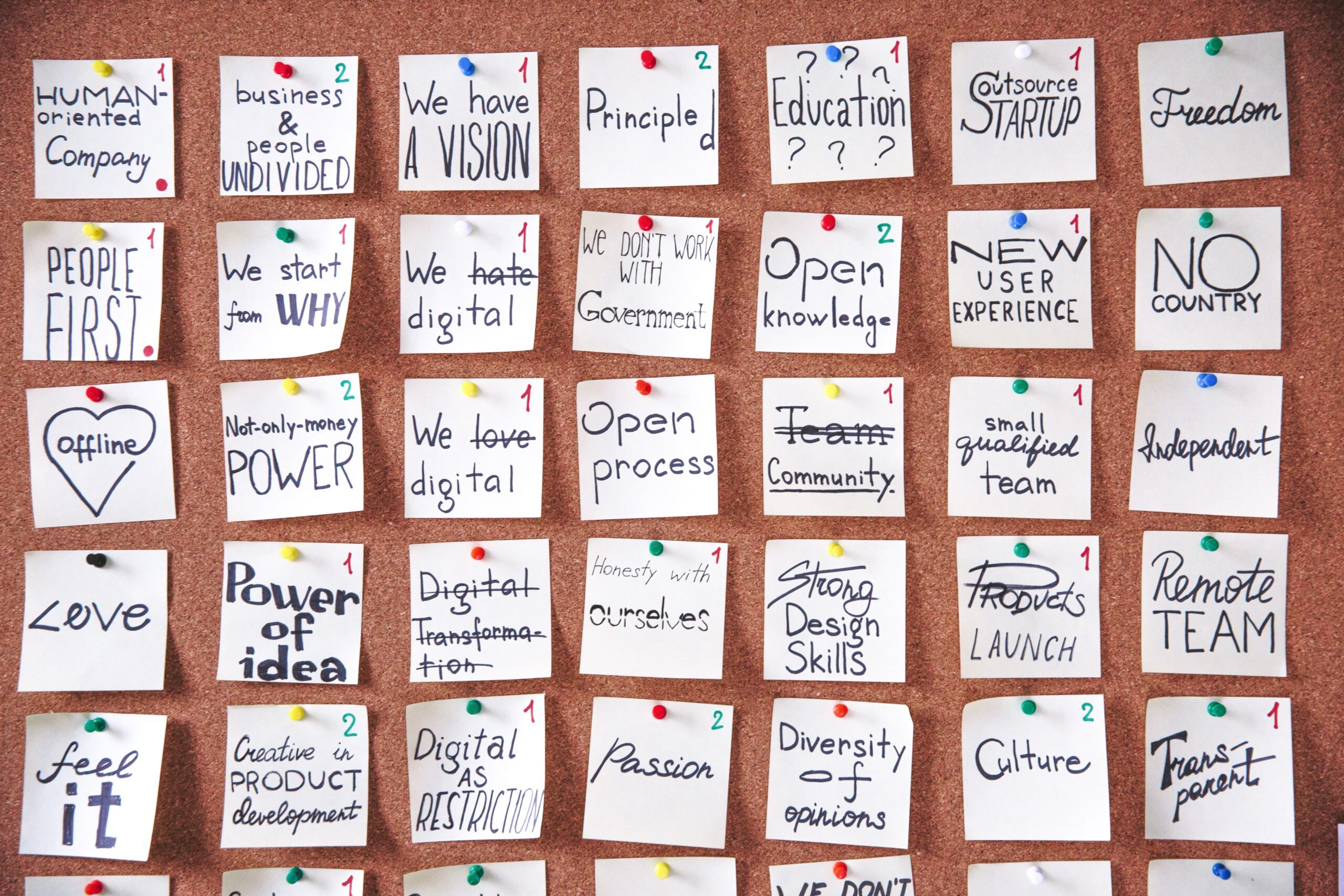How often have you found yourself running around, like a hamster on a wheel, dropping into bed at the end of the day tired, but without making significant progress toward your dreams and goals?
How often have you found yourself putting out fires or getting distracted, rather than working on the steps you wanted to take towards your goals and dreams?
If you can see recognise yourself in these scenarios, you’re certainly not alone. So many of us fall into the trap of doing, and forget that it’s the purpose of what we’re doing that matters, not the doing alone.
It’s easy to be busy – but are we busy with the right things?
This is the question we need to ask ourselves over and over again. Life is short, and using our time well, moving towards our dreams and goals, is a way to live a fulfilling life and one with purpose and meaning.
In order to focus on the things that will move us towards our bigger goals, we must set clear priorities. Our priorities become the things we spend our time, money and attention on. In order to live a fulfilling life, priorities need to be aligned with our values.
Too often, we fail to prioritise our values, we find ourselves unsatisfied, frustrated and often in the wrong place in life, despite working really hard.
The key is not to prioritise what’s on your schedule, but to schedule your priorities. – Stephen Covey
Prioritising gives us focus and makes us more effective and efficient. Setting clear priorities in line with our values and goals, sets the path ahead, making decisions easier, and eliminates distractions. However, if we don’t consciously determine our goals or priorities, the world around us fills up our days. So we end up filling our days with things that seem urgent, other people’s priorities, daily chores, instead of focusing on what is important to us.
It can be tempting to say ‘yes’ to everything because it gives us a sense of
1. being busy (making us feel valuable), and
2. being needed (which can also give us a sense of value).
Many cultures glorify busy-ness, but what we need instead is focused time spent on our true priorities. Not every action is equally effective at moving us forward towards our goals.
We’re contributing the most value in the world when we’re playing to our strengths, when we’re doing what truly matters to us, when we’re expressing our unique genius (we all have our version of it within us!) and when we’re living true to ourselves.
The world doesn’t need another busy person, the world needs more authenticity.
This doesn’t mean that we stop being helpful or take care of our homes. However, it does mean we start being more selective about what we say ‘yes’ to and setting better boundaries. Because our time is limited – and it is precious. If we don’t spend our time on what’s moving us in the direction that’s truly fulfilling, we won’t contribute all that we could in this lifetime.
So priorities are something we need to protect – with our planning, with our mindset, and with our actions. If we don’t, our dreams will get stifled by the minutia of life or other people’s agendas.
I remember so vividly the time when I was writing my Master’s thesis, alongside running my tea business. Everything else got pushed aside. For months I said no to 95% of social engagements. Although relationships are important to me, it was simpler to say ‘no’ to them all for a set time than deliberate over each one.
I also cut out all other distractions I could think of. I blocked out stretches of time, set my laptop and phone on airplane mode, and using only materials I downloaded previously, I wrote, wrote, wrote. I batch-cooked my meals and froze them, so I only spent time on cooking one day of the week, and still ate well (because health is my value).
I prioritised daily meditation, because that gave me better focus and inner calm. It was a complete change in my routine and a lot of work but I achieved an amazing result. I’m certain that without prioritising my thesis for that stretch of time, I wouldn’t have achieved the same.
Below are a few steps that can help you get focused on your key priorities and moving in the direction that truly matters to you:
1. Identify your priorities.
Restrict yourself to only a select few at a time. It’s tempting to over-do it but the whole point of prioritising is to focus your attention, not disperse it.
If you’re unclear on what your key priorities are, you can start by asking:
“Where do I want to be with my life in X months or years?”
“What do I most want to change/achieve at this time in my life?”
“What actions will take me there?”
“Which of my actions have the biggest ROI for my life satisfaction and success?”
“If I only had four hours a week to work on my most important goals, what would I focus on?”
“If I could only accomplish ONE thing per day in relation to my dreams, what would I choose?”
This way of mentally restricting ourselves gives us a good indication of what are the high-level actions that we need to prioritise.
As an example, you may want to improve your health and well-being, but you’re currently spending disproportionate amount of time on social media, or sitting in front of a screen, skipping meals and having one too many glasses of wine in the evening. Nothing wrong with a glass of wine, or technology. But by being clear on where you’re headed, daily decisions will become much easier – you’ll be able to say ‘no’ when something doesn’t line up with your priorities and say ‘yes’ to things that support them.
2. Protect your priorities.
Life, outside world and our own destructive habits can get in the way of pursuing what we want. But there’s a way around this. In order to change anything, we need to be aware of it first. So let’s get clear on:
“What tends to get in the way of your priorities?”
“What patterns or activities most often distract you from your true priorities?”
Once you know what gets in the way, you can plan a way to prevent it from getting you off track in the future. Set boundaries around saying ‘yes’ and ‘no’ – to others, but also to your own whims and impulses – in line with what will truly move the needle for you.
Ask yourself:
“How can I set up my environment (physical and social) to support my top priorities daily?”
“Whose support can I enlist to stick with my priorities?”
“What do I need to say ‘No’ to and how can I do it with integrity?”
3. Manage your priorities.
How do we make sure we stick with our high-level priorities throughout our days?
It’s crucial that we select a limited number of them at any one time. The point of setting priorities is to choose from all the things we could do, and focus on a few that we can give our full attention to.
It takes thoughtful planning, reflecting on our progress, and supportive tools to keep us on track. Below are a few ideas for you to try:
- Plan your day the night before. So there’s no room for veering off your focus in the morning.
- Prioritise actions (tasks) rather than outcomes (end goals). We can control our actions (e.g. do a morning pilates session 5 times a week; write an article in your area of expertise first thing every Monday) but we can rarely control everything about our outcomes (clear up persistent back pain; get X number of readers/subscribers/a book deal). Focusing our attention on things we can control will help us be more effective and calm.
- Write down encouraging statements and keep referring to them.
- What am I working on? Why am I taking this action? Why does it matter, what will I gain once I achieve/change/improve this?
Answer these questions and refer to them daily. - Visual reminders of your priorities – if you have a visionboard, put it somewhere you can see it every day, multiple times a day.
- Reminders in your calendar/your phone – schedule blocks of time to work on your priorities.
- End of day reflection and review. Appreciate yourself for what you got done, even if it wasn’t everything you planned. Review your day (what went to plan, what didn’t) and see if you can adjust your plan for the next day based on what you learn.
Another important point to consider when it comes to priorities is that they aren’t necessarily permanent. Priorities are working best for us when they’re aligned with our values, but unlike values which tend to be permanent or at least long-term, our priorities shift more frequently.
For example a priority like writing a book, getting a degree, or resolving a health challenge, may be at the top for us for some time, but once we’re through with that goal, the priority level may change. We can still have a maintenance plan for that area of life, but it may not be in the top place anymore.
Our life will evolve, and so will our priorities. And this is completely normal.
Now I’d love to hear how you set and manage your priorities – do you have any tips to share, or any questions or challenges you need help with? Please share in the comments below.
~ Mojca Henigman
A version of this post previously appeared on Mojca Henigman’s blog. Mojca is a Life Coach and qualified NLP Practitioner. She supports purpose-driven women to peel back the layers of self-sabotage, show up with courage and create a life full of meaning and positive impact.
DrivenWoman is a social platform connecting women who want to achieve their goals and dreams. Thousands of women around the world have joined our program and are achieving their life goals supported by one another. Join our FREE community the Doers Tribe.





0 Comments